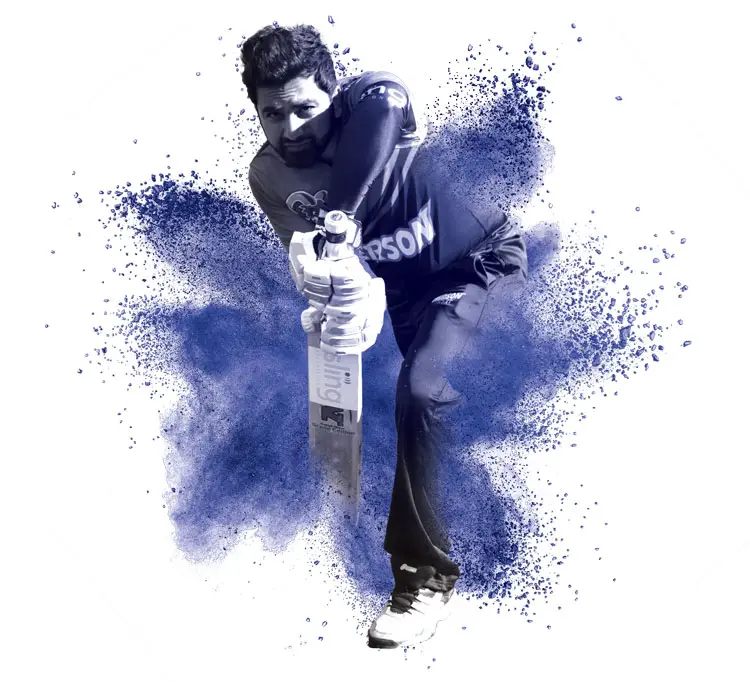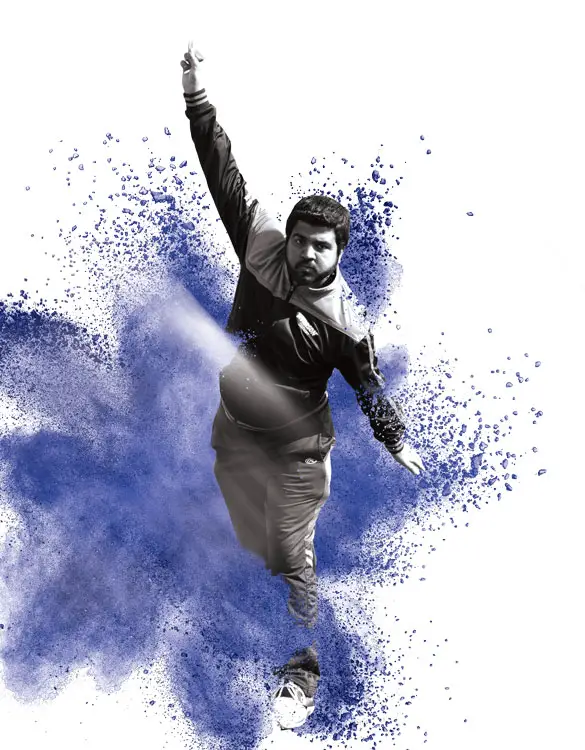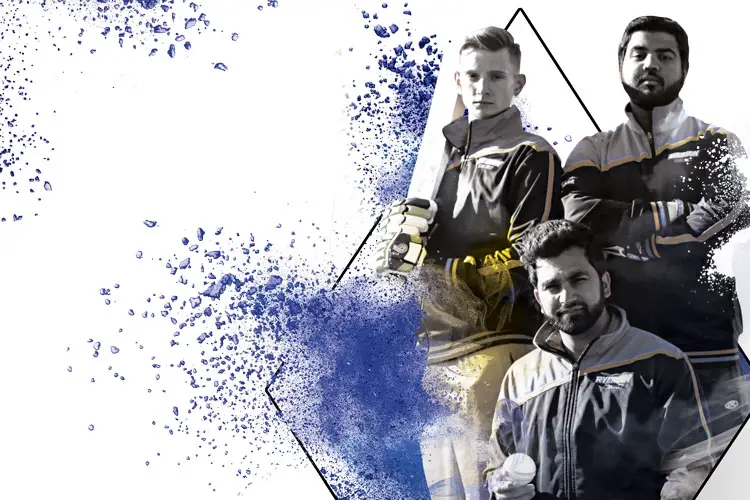The Buzz About Cricket
Three members of Ryerson University’s champion cricket team discuss being the faces of North America’s fastest-growing sport.
By Devin Ross Middle Tennessee State University
Nearly 140 years before baseball was invented, Americans in New York, Philadelphia and Washington D.C. were enjoying the country’s original national pastime—cricket.
Though the popularity of the sport waned in the mid-nineteenth century, a phenomenon most historians attribute to the rise in popularity of baseball caused by the Civil War, the original bat-and-ball sport of North America has seen a resurgence of popularity in the last several decades. Beginning with an influx of West Indian immigrants in the seventies, and then later redoubling as Asian workers came to America during the tech booms of the eighties and nineties, cricket has sprung up across the country.
In fact, according to the “Washington Post,” the Commonwealth pastime is now the fastest-growing sport in the country, with an estimated fifteen million fans and two hundred thousand players. The sport, which trails only soccer in terms of worldwide fandom, can now be found in every state in the U.S., with heavy concentrations in metropolitan areas that host larger foreign populations. Unsurprisingly, the game has also blossomed on college campuses, as many universities attract international students from across the world, making the pairing of students and cricket a natural fit.
American College Cricket (ACC), an authority unaffiliated with the NCAA but the de facto governing body for college cricket, was started in 2008 and hosts a championship not unlike the March Madness of college basketball. College cricket teams from across the country, including several from Texas, traveled to Fort Lauderdale, Florida, this March to compete in a tournament that saw nearly fifty games played over the span of five days.
After the dust cleared, the pack had been whittled down to four teams: University of South Florida, Ryerson, Everest University and the University of Texas at Dallas. After first defeating USF, their perennial kryptonite, the Ryerson Rams, a Canadian college based in Toronto, defeated the squad from Everest to take home their first ACC championship.

To find out more about the burgeoning popularity of cricket in North America, I asked three members of the team, Hassan Mirza, Obaid Ullah and Richard Perkins, about the sport’s culture. Mirza, who is a Ryerson alumnus—two of which are allowed on every club—is the team’s captain and accepted the ACC trophy from cricket legend Shiv Chanderpaul. Obaid Ullah is a fourth-year student and the club’s president, and Richard Perkins, who has two years left at Ryerson, is a veteran member on the squad. Ryerson has competed in the ACC since 2011, but this is the school’s first championship.
Devin Ross: So, congratulations on the win—how does it feel?
Hassan Mirza: It feels unbelievable. It was a really good tournament. It was knockout style, so if you lose one game, you’re out. Out of about seventy schools, twenty-eight made the tournament, and we beat pretty much all them to become number one. It feels really good.
Devin Ross: Have you been celebrating?
Hassan Mirza: Oh yeah, trust me. Some of us had to come back [to Toronto] the next day, but we’re still celebrating. We’re having a gala next week, so the celebration is on. The school is really happy.
Devin Ross: So you guys played Everest University in the finals. Did anything stand out?
Hassan Mirza: I would say that the semi-finals were more important to us this year; they felt more like the finals, because we ended up losing to the University of South Florida last time we played in the playoffs. It’s always a tough game when Ryerson and USF face each other, as both are strong sides. We played them in the semis, and the matchup was the closest of the six games we played in the tournament. It got down to the last few balls, so I think that’s the game to talk about.
Richard Perkins: Hassan batted very well, especially throughout the semi-finals. He’s sort of the anchor when we have a tough moment, so we have to give him some credit. He had a bit of an injury pretty early on, but he came back and put the ball on the bat.
Devin Ross: I know weather delays caused unexpected problems for some of the teams. Did Ryerson deal with any unforeseen variables?
Richard Perkins: Well, we actually received a surprising amount of support from the crowd and a lot of the teams. Their enthusiasm gave us some unexpected momentum that really helped lead to our win.
Hassan Mirza: It was a pressure game, and when we were on top, we seemed to get support from all the schools in the stands, and that was putting extra pressure on the other team.
Also, in the semi-final, our total was not so great. In a normal situation, ninety percent of the time we would’ve lost that game. We were losing for the first half, but the way we came back and pulled and got them out, happens like once in fifty games.
We had more support than USF and handled the pressure better, and from there we picked up the momentum that took us to the finals. By the time we got to the finals, we knew it was ours.
Devin Ross: The ACC website mentions that the championship and several other games were televised. Is that a new development?
Hassan Mirza: The turnout was pretty good, and we’re definitely grateful to Sony and a few others for providing media coverage, but I think there’s still a lot of room for growth.
When you see games like basketball and baseball, the level of publicity they receive at the university level is way, way more prominent. So I hope the media in the U.S. and Canada really get on it, giving the sport the coverage it deserves and paying some attention to it.
Devin Ross: Given that Hassan is an alumni and pretty experienced, does a lot of the team dynamic revolve around his leadership, or is the team pretty student-led?
Richard Perkins: [Laughing] Hassan is the captain, and he definitely runs the show; we all believe in him. We basically just listen to what he has to say because he has all the experience.

Hassan Mirza: It’s really more of a team effort. Obaid is the team president, and I’m the captain. I had the privilege to lead a talented team with a lot of collective experience, but we were also lucky to have some young, talented kids who gave it their all.
Really, the chemistry was fantastic. When we travel, the whole team stays in a villa; we don’t rent separate rooms, which helps build the chemistry between the guys. That has been the key, because on and off the pitch there’s been a lot of support for one another, a lot of understanding, and that has made a huge difference.
Devin Ross: How long have each of you been playing cricket?
Hassan Mirza: I’ve been playing since I was really young. I probably started when I was four, back home in Pakistan, and when I moved here, I just continued and never looked back.
Richard Perkins: I probably started playing around the same age, maybe six years old, back home in Barbados. Then I just continued through secondary school and when I came here to Canada.
Devin Ross: How was the cricket program when you arrived at Ryerson, and did it inform your decision to go to school there?
Richard Perkins: When I was looking at universities, I looked at the Ryerson cricket page, contacted Obaid and then realized they had a good program. So it definitely swayed my decision to come here.
Obaid Ullah: For me, no. At the time, I wasn’t aware of the cricket facility. I got involved in my first year when I met Hassan. With his help we built the program, and I started playing cricket properly and have enjoyed every second.
Hassan Mirza: Initially, when we first started the club about seven years ago, we had very little support, but, over time, as we started winning championships, we showed the school that there was a need for it, especially as more and more students became interested.
We won several Canadian National Championships, and we won the regional championships as well. After that, we started to get a bit of support, the right people on board and a lot of players helping behind the scenes. We just kept going, and a lot of that was thanks to Obaid.
He has taken the program to the next level, and now we are one of the strongest clubs and have the right structure in place. Through his work, the administration sees value in the program from a school perspective, as it attracts a lot of international and local students. Obviously, it’s a big influence when it comes to recruiting students who love the game. It’s a big draw.
Devin Ross: Do you see the popularity of cricket growing?
Hassan Mirza: Absolutely, I’m also the president for Canadian College Cricket, and through that we have seen the growth of cricket in several schools. Obaid is instrumental in helping with this, as are other club presidents like Abdul Rehman of Laurier University and Hamza Mirza of Waterloo.
Lloyd Jodah, the president of American College Cricket, has seen the value and opportunity in growing student-run cricket programs as well. He has also been a great mentor to me personally, and credit to him for helping with Canadian College Cricket.
The main factor, though, is that schools have finally started to support these teams financially. The infrastructure still needs to improve, though. A lot of schools have indoor facilities because they have gyms, but the next step is building outdoor fields for the summer.
Obaid Ullah: Right now, at least in Canada, there is a lot of talent and interest, but not enough financial investment. We are an underfunded team run by alumni and students. All of our expenses essentially come out of pocket, so it can be difficult.
In Canada, it’s a bit of a bigger sport and there’s a bit more support, but we’d still like to see more investment from local government and more funding for college cricket teams.

Devin Ross: How does the interest in cricket in Canada compare to other countries?
Obaid Ullah: It’s definitely not as strong, but we have enough talent here for it to be. If someone stepped in with funding, it would go a long way. We just need the financial backing to get to where cricket is in places like India and Australia.
Richard Perkins: Cricket is the main sport in many countries, like Pakistan, South Africa and India. With popularity comes money, but the difficulty is in building that support.
Hassan Mirza: To make any sport popular, you need to establish it at a grassroots level. So, Canadian College Cricket is working with an organization called Cricket Canada to form a pathway for growth for elementary and high school students, and you’d be shocked to hear how many schools are participating. Like Obaid said, there’s so much talent here, just not enough funding yet.
Devin Ross: Is enthusiasm for cricket in Canada much different than it is in the U.S.?
Hassan Mirza: There’s not much difference. Canada has better infrastructure at the moment, as it’s more divided in the States, which makes growth less streamlined. As a result, the sport is growing faster in Canada, which is why we will always beat the U.S. [laughs]
Obaid Ullah: From an economic perspective, in both countries, cricket is predominantly played in areas where there are more immigrants. Here in Toronto, there are more immigrants than there are in places like New Brunswick, a less-populated province.
In the States, places that have a large population of Caribbean immigrants, like New York and Miami, also have a more prominent cricket scene, so I think it has a lot to do with how much of an immigrant population there is and where they came from.
At least in North America, a lot of people play cricket through high school, but once they get to secondary school they give it up, because there are no careers in cricket. But, given the growth of college cricket in both countries, the sport and its industry are growing quickly. In fact, it’s already become quite large.









